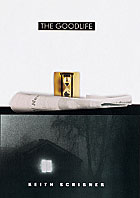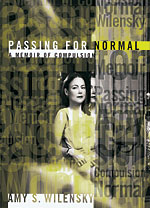About Books

By Keith Scribner ’84
Riverhead Books, 1999
When Keith Scribner took a writing class his senior year at Vassar, he assumed it would help him compose clear memos when he entered the work force. An economics major hoping to land a spot in a corporate training program, he little expected that Professor Karen Robertson’s Expository Writing class would send him in another direction completely. Fifteen years after graduation, Scribner still hasn’t set foot in corporate America; instead, he has pursued a “writing life,” which has recently resulted in his publication of The Goodlife, a morally complex novel that explores different takes on the American Dream.
Loosely based on the true story of the 1992 kidnapping of an Exxon executive in New Jersey, the novel tells the tale of a middle-class couple who commit a horrifying crime in an attempt to carve out a better life for themselves. But their seemingly perfect plan goes awry, resulting in tragedy for two families. While The Goodlife follows the basic arc of the true crime, the characters and the story’s details are the author’s invention. Told from five points of view, The Goodlife convincingly relates each character’s desires, needs, regrets, and failures. It’s an engrossing thriller that forces the reader to ponder issues of entitlement, self-deception, and social class.
In a telephone interview from his home in California, where he teaches creative writing at Stanford, Scribner said that after he dropped the idea of aiming for a career in business, he taught English in Japan for several years, then did carpentry work, all the while working on novels. Over a decade he completed two which never sold; and were it not, he said, for the encouragement of Robertson and Professor Paul Russell, both with whom he maintained contact over the years, he might have given up writing novels altogether. Instead, he went on to write The Goodlife. It took him four years to complete the novel; his agent sold it in less than a week. The book has been greeted with excellent reviews and has been featured in Barnes & Noble’s “Discover Great New Writers” series.
Now, Scribner is working on another novel, soon to be published by Riverhead Books. He’s also recently become a father and describes writing and parenting as similar in that they both require a large measure of self-analysis. Said the author, “The writing life is the examined life, and I think that being a good father also requires self-scrutiny. Being a father, like being a writer, makes me want to be a better person, to examine who I am more closely, and challenge my limitations as well as those values and assumptions that I live by. I hope the two [writing and parenting] continue to feed each other and that, as the years go by, being a better writer will help me become a better father, and vice versa.”
—Amy Arner Sgarro ’83
Amy Sgarro is a freelance writer and editor in New Jersey.

By Ellen May Galinsky ’64
William Morrow & Co., 1999
Ellen May Galinsky is president of the Manhattan-based nonprofit research center, Families and Work Institute, and her sixteenth book, Ask the Children is the first study ever to ask children for their views on parenting. “The either-or view that working mothers are bad—or good,” says Galinsky, “that child care is bad—or good. Should it be in quantity or quality time?… We were afraid to ask these questions of the children, afraid to know.”
Galinsky went ahead anyway, asking questions of a thousand children from diverse backgrounds, aged eight to eighteen—and marveled at the responses. Our assumptions about children’s ideas, she found, “are often at odds with reality.” Parents are doing well, according to their children; most don’t seem to be questioning whether or not their parents work, nor do they wish for more time with them. Contrary to what parents might think, time is not on top of a child’s wish list for employed parents. “Work if you want to work!” was a typical child’s response.
What children really wish, the study reveals, is that their parents be less stressed, less tired from work. “This was the most surprising find,” says Galinsky. “The extent to which children worry about us as parents. The problem isn’t that parents work, but how we work, and how our work affects our parenting; how it spills over into our home life; how we navigate the transition from home to work.” In turn, she notes, “Good experiences flow into good experiences at home, which pay dividends back at work.”
Galinsky’s fascination with how children grow and learn began at Vassar, where she started out as a political science major but soon found her way into Child Study 105. “The class was full, but I begged Ms. Dewsnap to let me in, and from the first day I was hooked. What was wonderful,” she says, “is that the field at that time was being invented. We were treated more like colleagues than students.”
Senior year, Professor Stone steered a child-struck Ellen toward Manhattan’s Bank Street College, where she was initially hired as a teaching assistant. During her twenty-five year tenure there—she was based in its research division and has both a master’s in education and an honorary doctorate from Bank Street—she authored numerous works, including photography books for children and a work on premature babies, inspired by the early birth of her son, Philip. Her second child, Lara, often lunched with colleagues and “became a group baby”; already Galinsky was teaching her own children about her work, as she urges parents to do in Ask the Children. “They should understand why we work, and what lessons we’ve learned from working.” As a schoolgirl, Galinsky had “hung around” her mother’s shoe store, wrapping packages. Thinking back, she says, “I understood my mother’s work. I was right there.”
Out of those Bank Street lunches grew the Family Center, a parent cooperative, which ultimately led to the co-founding, with colleague Dana Friedman, of the Families and Work Institute, which studies the changing family, workplace, and community.
Since the publication of Ask the Children, Galinsky’s life has been a whirlwind of booksignings, speeches, TV appearances. “But typically I’m asked, ‘Are you for or against working mothers?!’ I have to find a way to make these people see a different reality. And that’s hard—especially after the tenth time I’ve done it.”
All the same, she loves the work, is “energized” by it. Support has been strong from her close-knit, artistic family; from her staff; from Vassar alumnae, including her mother, Leora Osgood May ’28, her roommate, Karen Diamond ’64, and her editor, Toni Sciarra ’81, “who, like a parent, has been there for me.”
Now, Galinsky plans to go on “asking the children”: what they expect of work, how they deal with diversity, school pressures, violence. She hopes to establish an “Ask the Children” feature in the news magazines. Additionally, there are forty corporations to speak to about the book; ongoing research into the field of women and leadership—she counts off a dozen new topics. How do family and staff keep track of her?
“When I open the Vassar Quarterly,” says her mother, “and after I read the obituaries—I look to Ellen’s class notes to see what she’s done lately.”
—Nancy Means Wright ’48
Nancy Means Wright’s eighth book and third mystery novel,
Poison Apples, is forthcoming in July from St. Martin’s Press.

A Memoir of Compulsion
By Amy S. Wilensky ‘92
Broadway Books, 1999
Tourette’s syndrome came suddenly and simply upon Amy Wilensky: at the age of eight, while standing in front of a mirror at ballet class, she noticed her head jerking to the left. “At first,” Wilensky writes in her new book, Passing for Normal: A Memoir of Compulsion, “I found my new tic a fascinating quirk”—that is, until a girl in the class demanded, ‘What’s that thing you’re doing? With your head?’ The classmate’s interrogation began what would become two decades of excruciating self-consciousness and self-policing for Wilensky, as the head-jerks were joined by a variety of other tics: chin-thrusts, jaw-shifts, eye-rolls, teeth-clicks, and shoulder-turns that often produced pain and occasionally resulted in physical injury.
Wilensky could not overcome her body’s neurological demand that it be allowed to move in unaccountable ways, and so she developed a variety of physical and behavioral strategies to mask her condition. Passing for Normal is Wilensky’s thoughtful, unsentimental account of her struggle to suppress and hide the symptoms of Tourette’s and its common “partner in crime,” obsessive-compulsive disorder, whose rituals provide ways of harnessing the agitation brought on by Tourette’s.
College life, with its sudden lack of privacy, forced Wilensky to devise new strategies for disguising her rituals and tics. Eating meals—which for her involved counting the number of items consumed, and for each item, the number of times chewed—had to be done in the dining hall, often in a group, and in the midst of conversation. Wilensky notes, “It didn’t take too long before my new friends began to comment on my odd eating style—how I always chose similar foods, took forever to finish them, and chewed so methodically.”
Throughout college, Wilensky explained away her behavior as the signs of a quirky, nervous, or high-strung temperament. After graduation, however, she began to find such explanations increasingly unconvincing, both to herself and others. Finally, “I made myself evaluate the tics and habits as an entity, a group of maybe related, definitely intrusive compulsions that had an affect on everything I did.” She has since been helped by medication and behavioral therapy, as well as by the freeing discovery of a biological basis for her behavior.
Now married to fellow Vassar graduate Ben Hohn ’92 and doing freelance writing, editing, and tutoring in New York City, Wilensky has begun work on a novel. After spending several years analyzing the most puzzling and painful aspects of herself, she is ready to shift her focus: “I would like to not write about myself for a while.”
—Rebecca Egger
Rebecca Egger is an assistant professor of English at the University of Michigan. She is married to Bill Weinberg ’88.
